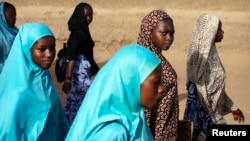As night falls over Gao in northern Mali, young women are practicing on a basketball court. Now that armed extremists have left, several girls in shiny track suit bottoms and low-necked tops have joined the boys.
Ramatou Touré moves quickly across the basketball court's cracked surface. After 10 months of Islamist occupation and one year with no practice, the 19-year-old high school student is back in training.
She said as soon as classes are over for the day, she runs to practice or goes running with a friend. Touré said she does not get tired because she loves the game.
Gao is known for its strong female basketball players, but Touré and many of her teammates had to sit on the sidelines due to the conflict that erupted in Mali in 2012.
Eighteen-year-old Mariam Maiga said they could not wear shorts and tank tops normally worn on the basketball courts, and only boys were allowed to play.
While Gao was under the occupation of al-Qaida-linked Islamists, women were forced to cover their bodies in public and men and women were banned from mixing socially. Violators faced public lashings or could have their hands chopped off.
Women who refused to follow the dress code were arrested. Many also say they were raped.
When the Islamists first arrived. Touré said she thought that she might just cover herself up and continue playing basketball. Instead she boarded a bus heading south, to the capital Bamako, together with tens of thousands of fleeing Northerners.
She said it was a tough year -- not only didn't she get to play, but she also couldn't go to school. Touré said she really missed the game.
Playing catch up
Now with the situation calmer - most of the girls are back home and have a lot of catching up to do.
Making sure they do so, is Oumar "Tonko" Cissé. A retired coach in his 60s, he also is the founder of the Center for Training and Promoting Sports [CFPS] in Gao.
He welcomed his "kids" with a smile and a cigarette in hand, next to the central pitch. But he recalled the occupation with bitterness.
The armed groups, "they were fools," he said, and he doesn't want to be reminded of those times.
As soon as Gao was liberated by French troops in January 2013, Cissé's sports center resumed its activities, though unfortunately he said his girls' team lost many of its best players as many families remain displaced in the south for fear of continuing insecurity in the north.
"It's a young team" as you can see, he said. Many of the players have a lot to learn. Some have more potential than the others, but Cissé said they are rebuilding step by step.
Meanwhile, living conditions in Gao remain difficult. Jobs are scarce, certain food items are hard to find, some government services are still lacking; the whole city continues to recover, along with much of Mali's north.
Insecurity lingers
The team is fortunate to find friendly competitions, however, with squads from neighboring towns. Just as fortunate, said Touré, is the fact they can play at all with sporadic fighting persisting.
Touré said that while she is happy to be back, Gao is not the same city. She noted that they used to play until nine, sometimes 10 at night. Now they must finish much earlier because of deep concerns. She said even when there is fighting in Kidal or Menaka it affects them in Goa, and on those days they must be home by 6:00 p.m.
As a reminder of the Islamists' continued presence, a French army vehicle passes by on the road opposite the sandy court. There are rumors of the Tuareg rebels recruiting.
For these basketball players in Gao, the coach said they can play an important role in restoring the city to the way it used to be by helping to keep young people focused on positive contributions they can make, rather than being lured by armed groups.
Cissé said all he and many Gao residents want is the best from the girls and to help them reach out to young people to rebuild a future.








